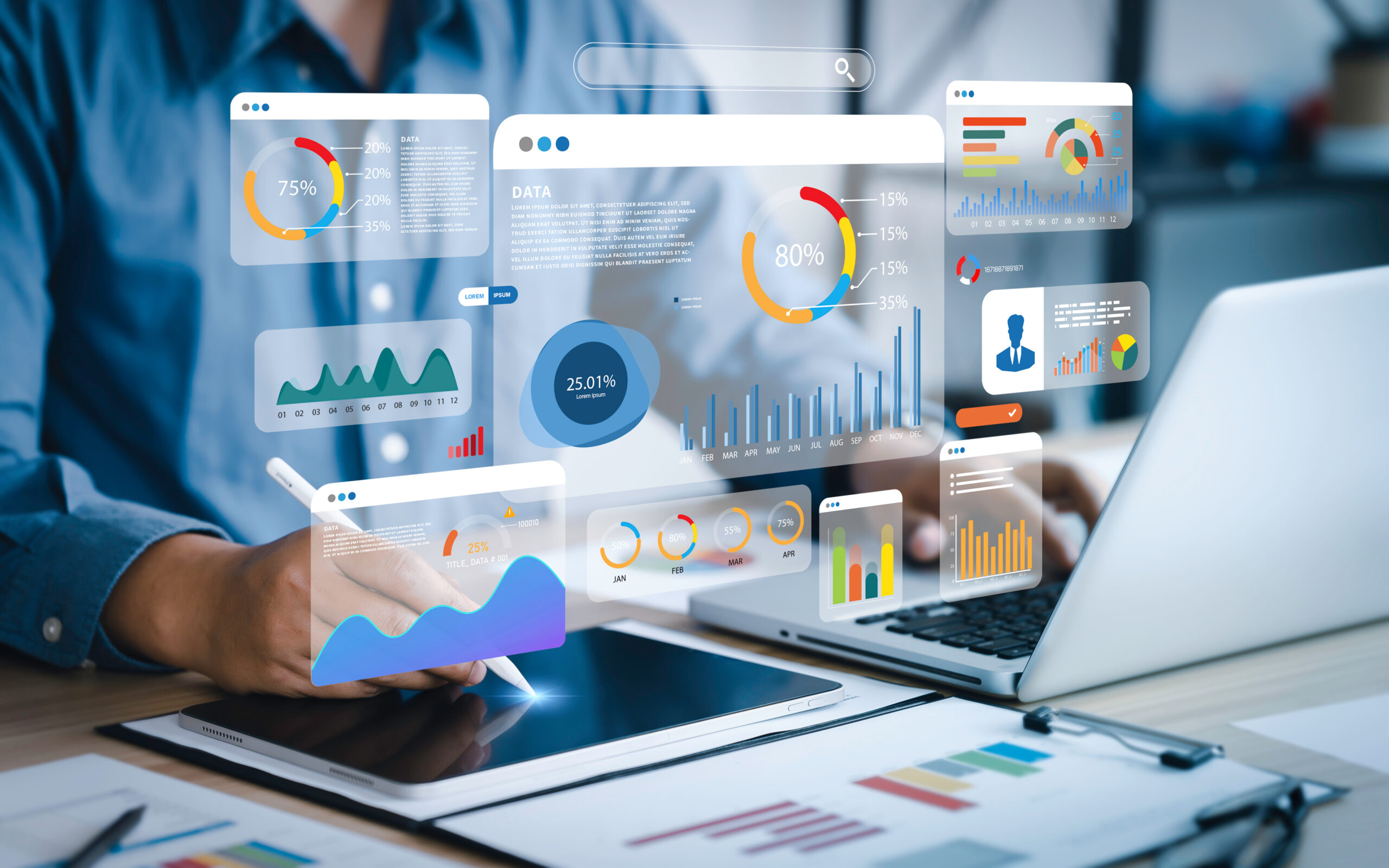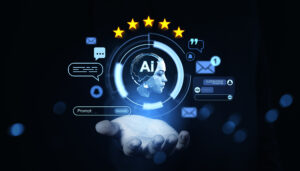How is AI in digital marketing reshaping the way brands connect with their audiences? Can AI in digital marketing really understand emotions and predict consumer behavior? What ethical challenges come with using AI in digital marketing to influence decision-making?
AI in digital marketing is driving a radical shift from generic messaging to intelligent, personalized engagement. From real-time data gathering and analysis to predictive modeling and sentiment detection, AI helps marketers uncover insights faster and with greater precision. The result? Campaigns that feel tailored to individuals, backed by deep customer understanding, and delivered at scale.
This blog also delves into how AI in digital marketing empowers hyper-personalization, optimizes content strategy, and enhances campaign performance, while emphasizing the importance of data ethics and human oversight. As technology advances, marketers must balance innovation with responsibility, using AI not just as a tool but as a strategic partner in crafting meaningful, ethical, and effective digital experiences.
The old days of marketing were a one-way broadcast. Brands and businesses crafted the messages, shouted them into the void, and hoped that something would stick. But today, that world feels light-years away.
Marketing has moved from guesswork to precision, from mass campaigns to deeply personalized conversations and experiences. And at the heart of this incredible transformation lies AI.
In digital marketing, AI is like a co-pilot designed to understand vast amounts of data, predict trends, and automate complex tasks. From the moment you search for a product online to the personalized ad that follows you across your social media accounts, AI is working behind the scenes, making digital interactions smarter, faster, and more relevant.
Whether you’re a marketing maven, a data scientist, or an interested consumer, AI in digital marketing is fascinating and changing both the industry as we know it and the way brands and consumers connect and interact.
Table of Contents:
AI in Data Collection & Management
Enhanced Campaign Optimization
Conversational Marketing & AI Assistants
Ethical & Operational Considerations
AI in Data Collection & Management
Anyone who works in data knows the sheer volume of information generated every second of every day is equal parts exhilarating and daunting. The digital world is a never-ending stream of clicks, views, likes, shares, and purchases. Historically, just collecting and organizing this data was a monumental task, leading to outdated insights by the time a data scientist or team member analyzed it.
But this is where we’ve seen AI step in to revolutionize the game. Imagine a tireless assistant working 24/7, across every digital channel, including your website, social media, CRM systems, email platforms, and so on. AI in digital marketing automates this data gathering, collecting information in real time. It then acts as a digital housekeeper, aggregating and cleaning all that information. This means identifying and fixing errors and removing duplicates, ensuring the data is reliable before an analyst even touches it.
It’s an absolute game-changer for marketing teams. I’ve seen it cut workflows in half, allowing team members to use their time and skills elsewhere, often pursuing more creative, innovative projects. In fact, according to a survey by the Digital Marketing Institute, teams that use AI in digital marketing say it’s having a big impact on their productivity, efficiency, and innovation.
One of the most powerful advancements is AI’s ability to structure unstructured data. Consider customer reviews, social media comments, chatbot conversations, images, and videos. These aren’t neat rows and columns. We call this unstructured data.
However, Natural Language Processing (NLP) tools can read, understand, and extract meaning from text, identifying key themes, emotions, and topics to transform noise into actionable insights. They offer a holistic view of customer sentiment that was previously nearly impossible to achieve at scale. Before this tech, marketers would have to manually sift through this mountain of information. Imagine how much time that took.
AI-Powered Customer Insights
Think of data collection as gathering the raw ingredients, and AI-powered customer insights turn those ingredients into a delicious meal that impresses all your dinner guests. The goal isn’t just to know what customers are doing but to understand why they’re doing it and what they might do next. For marketers, being able to tap into this information and predict the customer’s future is one of the most valuable insights that comes from AI in digital marketing.
This is where behavioral analysis and predictive analytics shine. AI models sift through oceans of data, from browsing history to purchase patterns, past interactions, and even demographics, to identify subtle trends and connections that humans may never spot. This allows marketers to create dynamic AI-generated customer personas. These are like living profiles that evolve with customer behavior, providing deep insights into motivations, pain points, and preferences as they evolve and move through the customer journey.
Beyond just what people say, AI can also decipher how they feel. Sentiment analysis and emotion detection tools use advanced algorithms to analyze text and even facial expressions or voice tones to gauge customer mood toward a brand, product, or campaign. This level of understanding allows marketers to fine-tune messaging, address issues proactively, and build more empathetic connections than they ever could before, helping drive long-lasting loyalty.
Personalization at Scale
The holy grail of modern marketing is personalization. Consumers today expect brands to “know” them and offer relevant products, remember their preferences, and communicate in a unique and tailored way. I’m sure we all feel this way, even if we don’t realize it. When I’m shopping online, I always feel more interested in and connected to brands that offer a unique, personalized experience. It feels like they took the effort to get to know me before pushing me a random product, which I appreciate!
Thanks to AI in digital marketing, what was once a labor-intensive process is now possible at a remarkable scale.
Imagine a website where the layout, product recommendations, and even the promotions you see are dynamically generated just for you, in real time. This is called dynamic content generation, and several brands already use it. The Amazon website is actually a great example of this, as your entire experience on the site is tailored to you based on your preferences, searches, and purchase history.
This practice of personalization also extends to hyper-targeted email and ad campaigns. Gone are the days of mass email blasts; they just don’t work anymore. AI can predict what products you might be interested in, when you’re most likely to open an email or click on an ad, and even what specific message will resonate most.
Adaptive user experiences are another hallmark of AI in digital marketing. Think about how Netflix seems to know your next favorite show, or, again, how Amazon always has something relevant on its homepage. These platforms use AI to continuously learn and make adjustments based on you, crafting experiences that make you feel seen and valued.
Enhanced Campaign Optimization
Running a digital marketing campaign used to involve a lot of educated guesswork, followed by manual adjustments. Today, AI has transformed campaign optimization into a continuous, real-time feedback loop, making campaigns smarter, more efficient, and more effective.
AI has dramatically accelerated the process of A/B and multivariate testing, which involves testing different versions of an ad or landing page. Instead of manually running tests for weeks, AI can quickly analyze multiple variations, identify what performs well, and even suggest new ideas.
Beyond testing, AI in digital marketing also excels at performance forecasting and automated adjustments. Machine learning algorithms predict how different budget allocations, designs, or targeting strategies will impact campaign performance.
This ensures resources are always channeled to the most effective areas and frees marketers to focus on strategy and creativity, rather than getting bogged down in endless manual updates.
Conversational Marketing & AI Assistants
The rise of chatbots and virtual assistants has changed how consumers engage with brands, offering instant, personalized interactions at scale.
These AI-driven assistants can handle customer queries, guide users through product selection, troubleshoot issues, and even complete transactions 24/7. This continuous availability, often in multiple languages, means customers get immediate support, improving satisfaction and reducing strain on human customer service teams.
Beyond general support, AI assistants are becoming more adept at AI-driven lead qualification. By interacting with potential customers, they can gather key information, assess needs, and gauge interest levels, then pass qualified leads to the sales teams. With this approach, human effort is focused on prospects most likely to convert, significantly boosting efficiency.
From handling routine inquiries to offering assistance, conversational AI makes brand interactions more human-like and accessible, transforming the customer journey from reactive support to proactive.
AI in Content Strategy
Content is king, but we all know that consistently creating effective content can be challenging. AI isn’t here to write your novel, and you shouldn’t rely on it to handle all your communications, but it is changing how marketers develop, optimize, and distribute their content strategies.
Natural Language Generation (NLG) tools can quickly produce high-quality written content, such as product descriptions, routine reports, or even social media updates. These tools can turn structured data into coherent, readable text, freeing human copywriters to focus on more creative, strategic, and emotionally resonant pieces that AI in digital marketing can’t master.
AI in digital marketing is also essential for topic and keyword optimization. AI tools can analyze search trends, competitor content, and audience questions to identify optimal topics and keywords to attract the right audience. This ensures content isn’t just produced quickly, but strategically aligns with what users are searching for to enhance visibility and engagement. In the digital marketing world, where your content ranks online, it is one of the most important elements of any digital campaign, and using AI to strategize is one of the most effective ways to stay on top.
Ethical & Operational Considerations
While the opportunities are vast, adopting AI in marketing comes with its own set of challenges. As a data executive with a background in behavioral science, I always emphasize that powerful technology demands immense responsibility, especially when we’re working with personal customer data.
Data privacy and compliance are paramount with any tech innovation. AI systems thrive on data, and marketers must be transparent about collection practices, ensure they gather consent, and safeguard sensitive customer information to maintain trust. Missteps here can have severe reputational and legal consequences that can last a lifetime.
Another critical concern is bias in AI models. AI learns from the data it’s fed, so if you’re using biased data or have a bias yourself, odds are the AI model will be biased, too. Responsible use requires rigorous auditing of datasets, continuous monitoring of AI outputs, and a commitment to building diverse teams that can identify and mitigate bias.
The most effective approach is human-AI collaboration. AI in digital marketing, and in general, is best used to enhance human intelligence, not replace it. Marketers should leverage AI for its efficiency and analytical power, but maintain human oversight for creativity, ethical judgment, and empathy. The most successful people will be those who master the art of working with AI, focusing on what only humans can do best.
The Road Ahead
In marketing, AI is like a skilled co-pilot, there to help you navigate the skies—or, in this case, the digital marketing landscape.
Emerging AI trends like generative search, where AI answers complex queries by synthesizing information, rather than just linking to pages, will change how consumers find products and services. Emotion AI, while still evolving, promises a deeper understanding of customer sentiment and reactions. Agentic AI could revolutionize campaign management, where systems can autonomously plan and execute tasks. The possibilities are endless and continuously evolving.
For marketers, preparing for future shifts means continuous learning. This means building AI literacy, gaining as much hands-on experience as possible, and focusing on your uniquely human skills that AI can’t replicate.
The digital marketing landscape will continue to evolve at lightning speed. By embracing AI in digital marketing as a strategic partner, marketers can not only navigate these changes but also actively shape a more intelligent, personalized, and effective future.









One Response
Your blog is a breath of fresh air in the often mundane world of online content. Your unique perspective and engaging writing style never fail to leave a lasting impression. Thank you for sharing your insights with us.